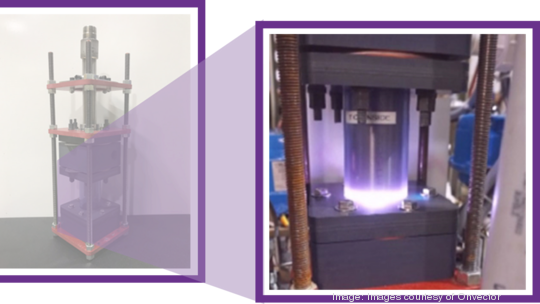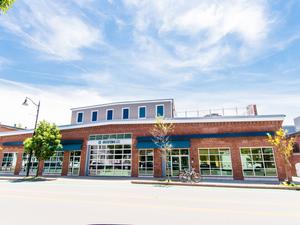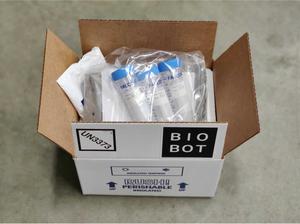
Somerville-based water treatment tech startup Onvector is in the business of getting rid of forever chemicals.
Since 2013, Onvector has been working to treat the most toxic wastewater out there. More recently, it has secured military bases to pilot its solution.
Dan Cho, founder and Harvard graduate, explained the company’s plasma vortex solution as an advanced oxidation process, which is “the fastest growing segment” in water technology and equipment. Plasma, Cho said, occurs when you energize gas. He said the vortex solution prevents the water from behaving like a copper wire or conductor.
“Plasma is in the same category as ozone and UV," Cho said. "Ultraviolet light is sometimes used for water treatment to disinfect, and ozone can do more than disinfect. It can also break down organic compounds."
Plasma proves to be a more powerful solution than ozone, according to Cho. It has now caught the eye of Joint Base Cape Cod. The full scale, joint-use base is piloting the technology to deal with per- and polyfluoroalkyl substances (PFAS) in the water, a group of manmade chemicals that are hard to break down.
Prior to the base’s interest, Cho said his company worked with several pharma and chemical companies to pilot the solution. It has since received much of its funding from federal agencies.
“We actually pivoted from these two areas in order to zero in on our current focus,” Cho said. “We've been building strong relationships with clients among military bases for piloting and ultimately installing our technology.”
Cho works with five other employees, three of whom are based in Massachusetts. Cho himself splits his time between Boston and Philadelphia. Onvector's home base is Greentown Labs, the Somerville-based cleantech incubator.
Cho came to water treatment from the world of cardiovascular diagnostics, where worked just prior to founding Onvector. That might sound like a major pivot, but Cho said he was able to transfer his fluid dynamics knowledge from blood viscosity to water.
Cho began working as a consultant for water tech companies. Then, at Drexel University’s plasma institute, he realized the scale of fracking and wastewater treatment: They were real issues that needed an innovative solution, he decided.
“Fracking is really a water problem," Cho said. "Billions of barrels of water are being generated as produced water… That water is laden with bacteria, and salt, and many other contaminants, some radioactive material. How to treat that water is essentially a dilemma."
Though Onvector does not specifically work with produced water at the moment, Cho said the company has “cracked the code” on treating water with plasma.
“People have speculated plasma would be awesome for purifying, for destroying contaminants and disinfecting bacteria [and] virus—and that's true,” Cho said. “But it's been notoriously hard to develop because water is conductive.”
Onvector’s solution, he explained, uses continuous reliable lightning, or arc lightning, in water to create stable plasma.
The solution has proven to be more energy efficient than traditional wastewater treatment and has been recognized by the Solar Impulse Foundation for its work. Wastewater treatment could be just the beginning for Onvector: Cho believes plasmas have "thousands and thousands" of applications in medicine and fuel conversion, all yet to be invented.
Cho said he hopes Onvector will work more with the Department of Defense and other government entities to rid the world of PFAS and other hazardous materials in the water.
The military space, he said, has the most extreme problem in that area.
“These are the emerging contaminants that will be the national story of 2021 and 2022," Cho said. "After Covid [and] after the election, people will begin to pay attention to this forever chemical issue."
Jordan Frias is a contributing writer for BostInno.
Correction: Dan Cho graduated from Harvard University, not MIT. We regret the error.






